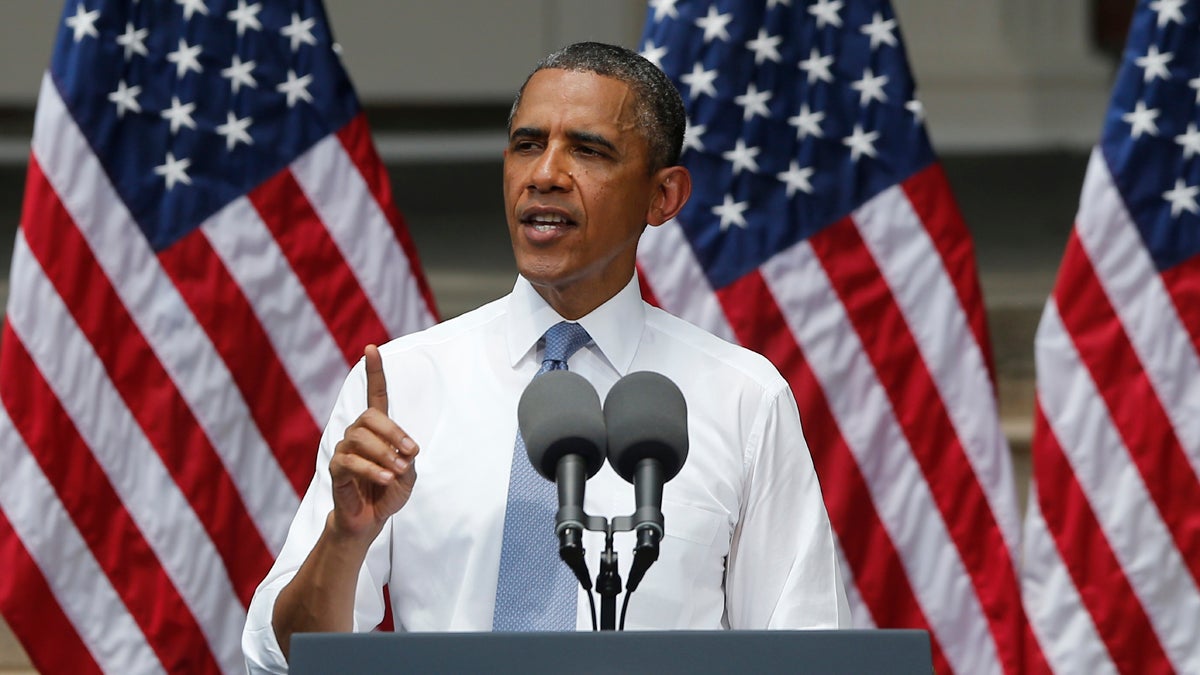Court’s decision on Voting Rights Act justified and welcome

President Barack Obama, shown here speaking on climate change at Georgetown University on Tuesday, expressed disappointment at the U.S. Supreme Court's decision to invalidate the "preclearance" provision of the Voting Rights Act. (AP Photo/Charles Dharapak, file)
The U.S. Supreme Court’s decision to strike the “preclearance” provision from the Voting Rights Act is a recognition that, while we need to be vigilant about protecting rights, we also need to use common sense standards and tactics when deciding how and if those rights are in jeopardy.
The following is a work of opinion submitted by the author.
To some people, the Civil War never ended. There are those in the South who continue to venerate Jeff Davis, who hang the Confederate flag in their living rooms, who wax nostalgic about great-great-great grandfather Caleb who was killed at the Battle of Shiloh. The recent dust-up with Paula Deen shows that while we have definitely evolved as a society, there are still vestiges of “growing up that way.” As someone once said, the South is a place. East, West and North are just directions.
But just as there are traces of the segregated past that will never die in the hearts of men, our laws have made sure that equality is the touchstone of our civil society. You could argue with the suggestion that we are a color-blind society, but you’d be hard pressed to deny that monumental, sea-change progress has been made since the days of Jim Crow.
My own father went down south to Mississippi in 1967 to register black voters and aspiring office holders. He also represented indigent black defendants in the jails of Copiah County. It was only a few years after three young men, two Jews and an African American, were murdered by the Klan and buried in a ditch in that other Philadelphia below the Mason-Dixon. Dad had his own near miss with the Klan, and came home chastened and convinced that what he’d seen in Mississippi was no different than what you would have seen in Nazi Germany.
But that was 50 years ago. No matter how much we lament the racial divide that still exists at an epidermal level in this country, we have traveled light years from that place where young black men were murdered for whistling at a white woman. The Supreme Court recognized that fact twice this week, first on Monday by forcing us to “prove” that affirmative action was effective and then, more dramatically on Tuesday, by invalidating a provision of the Voting Rights Act that was frozen in bitter, segregated amber.
Laws must change with the times
Section 5 of the Voting Rights Act, the “preclearance” provision, required certain states that had historically shown significant racial disparities in voting practice and procedure to get prior federal approval for any changes they wanted to institute. The provision was repeatedly reauthorized, most recently in 2006. Unfortunately, the barometer by which those disparities and alleged inequities were measured hadn’t been changed in five decades, leading many observers to believe that it was obsolete. In other words, they argued that by using outdated criteria to prevent inequality, they ended up promoting it.
This was borne out by the fact that in Mississippi, the place of my father’s earliest crucible, a majority of office-holders were African American while in Massachussets there was only the smallest minority. The fact that Mississippi was burdened by the preclearance requirements and Massachussets was not is a clear example of the arbitrary nature, and ultimate unfairness, of Section 5.
Five justices on the high court agreed. As Chief Justice John Roberts wrote in his majority opinion, “Our country has changed, and while any racial discrimination in voting is too much, Congress must ensure that the legislation it passes to remedy that problem speaks to current conditions.”
Four justices disagreed with that assessment, as did many of those who lobbied to maintain the preclearance requirement. Most vocal among them was the country’s first black president, who stated that “Today’s decision invalidating one of [the Voting Rights Act’s] core provisions upsets decades of well-established practices that help make sure voting is fair, especially in places where voting discrimination has been historically prevalent.”
Protecting rights with common sense
The problem with the president’s message is that it is retrospective, framing the future in terms of the past. While it is true, as Santayana said, that those who ignore the past are doomed to repeat it, we cannot legislate based upon presumptions. In order to justify inequitable treatment of sovereign states under a federal regime, there has to be legitimate and empirical evidence that it is necessary. We can no longer measure inequality by the length of a rope.
That’s why the court’s decision is both justified and welcome. It is a recognition that we cannot punish people for the mistakes of their ancestors, and that while we need to be vigilant about protecting rights, we also need to use common sense standards and tactics when deciding how and if those rights are in jeopardy.
We owe that to the people who fought for liberty and justice, for all.
WHYY is your source for fact-based, in-depth journalism and information. As a nonprofit organization, we rely on financial support from readers like you. Please give today.

